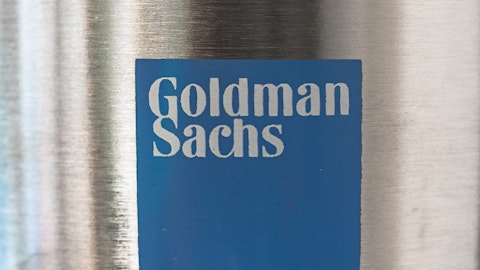We recently compiled a list of the 8 Most Profitable Blue Chip Stocks to Invest In. In this article, we are going to take a look at where Mastercard Incorporated (NYSE:MA) stands against the other profitable blue chip stocks.
The September inflation report came in hotter than expected and showed that it remains sticky. Headline inflation rose by 2.4%, slightly above the anticipated 2.3%, and down from 2.5% in August. Month-over-month, CPI increased by 0.2%, exceeding the forecast of 0.1%.
Core inflation, excluding food and energy, also came in higher than expected at 3.3%, compared to the anticipated 3.2%, marking a slight increase from August. On a monthly basis, core CPI rose by 0.3%, which matched August’s figures but was above expectations of 0.2%.
Following the report, the market is expecting a 25 basis points rate cut to no rate cuts in the upcoming Fed meeting. According to the CME FedWatch tool, 79.9% of interest rate traders expect the rate cuts to be at 450-475 bps at the coming Fed meeting while 20.1% expect the rate cut to stay the same. At the beginning of the month, 32.1% expected a 50 bps rate cut, while 67.9% anticipated a 25 bps cut.
Understanding Inflation Trends and Federal Reserve Strategy
Despite the sticky inflation, IBM’s vice chair, Gary Cohn believes that the Fed will cut rates by 100 bps this year. In an interview at CNBC’s ‘Money Movers’, he suggested that the U.S. is experiencing what a soft landing looks like, with inflation decreasing but not steadily. He indicated that reaching the Fed’s 2% target will be challenging, as inflation rates are likely to fluctuate around this level.
Cohn noted that for the first time in nearly two decades, the Fed is balancing both sides of its dual mandate, employment, and price stability, after focusing primarily on one at a time. He believes the Fed is making the right decisions and is currently in a delicate position as it missed meeting opportunities this year.
Cohn expects that the Fed will implement a total of 100 basis points in rate cuts this year, likely consisting of 25 basis point reductions over the next couple of months. When asked about inflation targets, he expressed a preference for slightly exceeding the target inflation rate, suggesting that a rate of around 2.2% would be more acceptable in a growing economy than undershooting the target.
Cohn also highlighted concerns about geopolitical risks and said that global tensions could lead to inflationary pressures by disrupting supply chains and increasing shipping costs.
Our Methodology
For this article, we use stock screeners to identify nearly 30 stocks above $100 billion market cap and $10 billion TTM net income. Next, we narrowed our list to 8 stocks that had a 5-year net income compound annual growth rate of above 10% and were most widely held by institutional investors. The most profitable blue chip stocks are listed in ascending order of the hedge fund sentiment, which was taken from Insider Monkey’s Q2 database of 912 hedge funds.
Why are we interested in the stocks that hedge funds pile into? The reason is simple: our research has shown that we can outperform the market by imitating the top stock picks of the best hedge funds. Our quarterly newsletter’s strategy selects 14 small-cap and large-cap stocks every quarter and has returned 275% since May 2014, beating its benchmark by 150 percentage points (see more details here).

A woman using a payment terminal at the checkout of a store showing payment products and solutions.
Mastercard Incorporated (NYSE:MA)
Market Cap: $461.871B
5-Year Net Income CAGR: 12.81%
TTM Net Income: $12.258 billion
Number of Hedge Fund Holders: 142
One of the most profitable blue-chip stocks, Mastercard Incorporated (NYSE:MA) operates as a technology company in the global payments sector and facilitates connections among consumers, financial institutions, merchants, governments, and businesses to enable secure and efficient electronic payments. It uses its well-known brands like Mastercard, Maestro, and Cirrus to provide a range of payment solutions through a flexible multi-rail payments network.
To grow its core payments, the company aims to increase consumer payment adoption, capture new transaction flows like B2B payments and remittances, and innovate payment methods such as contactless transactions and digital currencies.
The company improves its services by providing insights, consulting, and loyalty solutions, while also expanding its reach to new customer segments and geographic markets. As of Q2, the company’s network includes 3.4 billion debit, prepaid, and credit cards issued globally.
On October 10, Mastercard (NYSE:MA) and Citi announced a partnership to facilitate cross-border payments to Mastercard debit cards in 14 markets, with plans for further expansion. Using Citi’s WorldLink Payment Services and Mastercard Move, the service allows near-instant, full-value payments almost 24/7. The solution is accessible to Citi clients across 65 countries and supports several applications, including insurance payouts and gig-economy payments.
On September 30, The Fly reported that Oppenheimer initiated coverage of the company with an Outperform rating and a price target of $591. The firm expects that Mastercard will benefit from a prolonged transition from paper-based payments to card payments, projecting high-single to low-double-digit growth in payment volume over the next three years. The analyst expects Mastercard to outpace Visa in revenue growth by 2% over the next two years.
Overall MA ranks 8th on our list of the most profitable blue chip stocks to invest in. While we acknowledge the potential of MA as an investment, our conviction lies in the belief that AI stocks hold greater promise for delivering higher returns and doing so within a shorter timeframe. If you are looking for an AI stock that is more promising than MA but that trades at less than 5 times its earnings, check out our report about the cheapest AI stock.
Read Next: $30 Trillion Opportunity: 15 Best Humanoid Robot Stocks to Buy According to Morgan Stanley and Jim Cramer Says NVIDIA ‘Has Become A Wasteland’.
Disclosure: None. This article is originally published at Insider Monkey.





